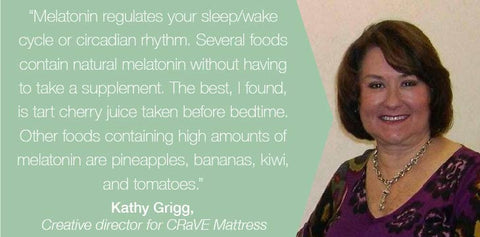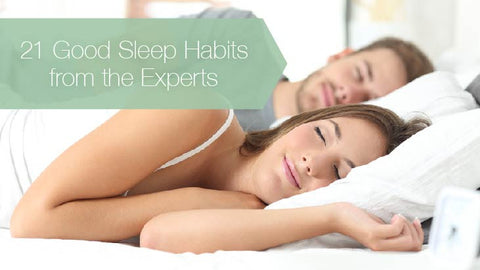
Do you find yourself drifting off to sleep at work? Or do you lay awake at night tossing and turning?
You may be suffering from sleep deprivation. So what exactly is sleep deprivation you ask? Sleep deprivation is becoming a serious epidemic in America. But the majority of our sleep problems can be solved by establishing good sleep habits through an evening routine.
We interviewed several, doctors, sleep specialists and wellness experts about their evening routines and ways they get better sleep.
How to Get Better Sleep - Good Sleep Habits
With sleep having such a powerful influence on many of the critical areas of your life, you might be eager to learn how to fall asleep fast and how you can stay asleep through the night, every night.
Although developing good sleep habits can help many people overcome their sleep problems, it’s important to note that sleeping disorders such as sleep apnea pose a threat to more than just the amount and quality of your sleep. Sleep apnea, for instance, can actually jeopardize your life. If you think you suffer from sleep apnea or another life-threatening disorder, or making lifestyle changes isn’t enough to help you get the rest you need every day, talk to your doctor about the difficulties you are experiencing.
Develop the following Good Sleep Habits to increase the amount of quality sleep you get every night:
-
Avoid the News or Disturbing Stories: Anxiety and stress can disrupt your sleep or even keep you from falling asleep quickly. News, scary movies or even just thinking about things that cause you stress should be avoided before bedtime.
Dr. Richard Shane, the founder of Sleep Easily and a psychotherapist, said, “I do my best to not be on electronic devices during the 30 minutes before bed. I never watch the news or read an online newspaper in the evening. Too disturbing. I read news once during the day so I can be informed without it disturbing my sleep.”
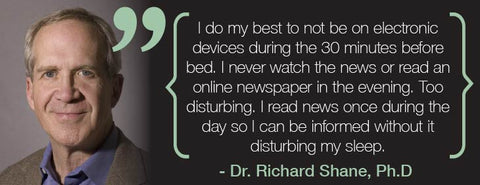
2. Open Your Nose: “Do everything possible to open your nose as wide as possible before you go to sleep,” suggested Dr. Steven Y. Park, M.D. the author of the Amazon best-selling book, Sleep, Interrupted: A physician reveals the #1 reason why so many of us are sick and tired.
“Treat your allergies, use saline irrigation or a Neti-pot, try nasal dilator strips, or even consider surgery to optimize your nasal breathing. Avoid eating or snacking within 3-4 hours of bedtime. This will prevent acid, digestive enzymes, bile and bacteria from reaching your ear, nose, throat and lungs. Not only will you sleep better, but you’ll also find it easier to lose weight. Don’t listen to dermatologists who say to avoid sleeping on your tummy since it can aggravate facial wrinkles. If you prefer to sleep on your stomach or your side, stay that way, since sleeping on your back will lead to more obstructed breathing and arousals, which can lead to more facial wrinkles.” Dr. Park was rated a "Top 10 Online Influencer of Sleep Discussion" by Sharecare.com and voted onto the list of Best Sleep Disorder Blogs of 2016 by Healthline.com.
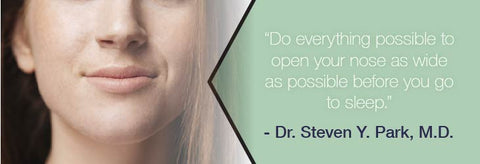
3. Set the Right Temperature: Ensure you have the best room temperature for sleeping. According to the National Sleep Foundation, many sleep experts recommend that you should keep your bedroom cool, around 65 degrees Fahrenheit, in order to get a good night’s sleep. Over the course of a day, your body temperature naturally goes up and down. These changes in temperature are related to your sleep cycle. In general, your body temperature will reach its lowest point around 5am and it will rise as the morning starts. If the temperature in your sleeping space is too high, it can prevent your body from cooling as much as it naturally wants to, which can lead to restlessness and unsatisfying sleep.
4. Make Yourself a Drink to Help You Sleep: Dr. Robert S.Rosenberg, Board Certified Sleep Medicine Physician and author of The Doctor's Guide to Sleep Solutions for Stress & Anxiety, suggests making “a smoothie with tart cherries, that contain melatonin and have been found to help with sleep, almonds for relaxing, magnesium, yogurt for tryptophan and cinnamon for flavor and banana for potassium.”
Other common drinks to help prepare your brain and body to sleep are chamomile and jasmine tea.
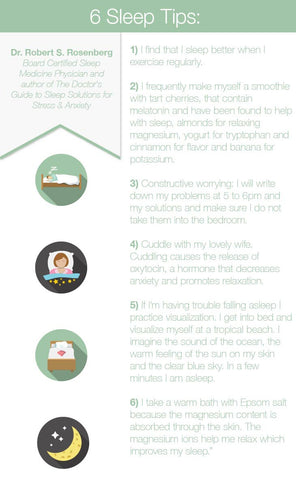
Instead of taking prescription sleep aids, Kathy Grigg, the creative director for CRaVE Mattress, suggests eating foods rich in melatonin: “Melatonin regulates your sleep/wake cycle or circadian rhythm. Several foods contain natural melatonin without having to take a supplement. The best, I found, is tart cherry juice taken before bedtime. Other foods containing high amounts of melatonin are pineapples, bananas, kiwi, and tomatoes.”
5. Cut Off Your Caffeine Consumption: On his popular podcast’s website, Shawn Stevenson recommends that people set a “caffeine curfew” and adhere to it daily. In order to prevent caffeine from interfering with your ability to sleep, Stevenson recommends that you stop consuming it in time for your body to expel it from your system prior to you going to bed. In general, you should stop consuming caffeine around 4pm or even earlier if you are caffeine sensitive.
6. Sleep at the Right Time: Research has shown that people enjoy the most healthful benefits sleep can provide if they sleep during the hours of 10pm and 2am every night. If you sleep between these times, your body will benefit from sleep’s most significant rejuvenating effects.
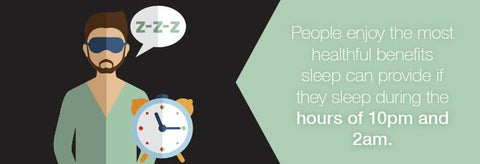
7. Black It Out: Humans sleep better in a sleeping space that’s dark. Even if you use a sleep mask, it doesn’t mean your body won’t react to light in your bedroom. Your skin has light-sensitive receptors that will pick up light in your bedroom and send signals to your brain and bodily organs. These signals have the capacity to interrupt your sleep. “I like total darkness, so I have blackout shades in my bedroom,” said Dr. Shane when talking about what he does to sleep better.
“Melatonin is sensitive to light even with your eyes closed. Draperies with blackout lining, sleep masks, no blue light from electronics will all help to keep your melatonin production regulated,” suggested Kathy Grigg.
8. Exercise Regularly: Regular exercise can help improve the amount and quality of the sleep you get at night, even if you hit the gym in the early morning hours. “I find that I sleep better when I exercise regularly,” said Dr. Rosenberg when asked about his good sleeping habits. While the National Sleep Foundation reports that working out in the afternoon can also help improve your sleep, the organization warns that exercising too close to your bedtime can make it more difficult for you to fall asleep. To prevent your workout from interfering with your sleep, finish your exercise regimen at least two hours before you go to bed.
9. Turn Off Electronic Devices and Stay Away from Blue Light: Arianna Huffington, founder of the Huffington Post and author of The Sleep Revolution, suggests to “take all devices and gently escort them out of the bedroom.” As a general rule, it’s wise to remove or power down the electronic devices in your sleeping space about an hour before you plan to go to sleep. If you have certain blue-light sources that you can’t turn off, cover them or use a blue-light blocker so that the light they emit is not visible and will not disturb your sleep.
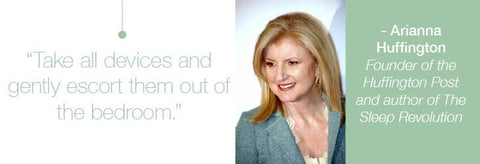
Arianna Huffington knows the dangers of sleep deprivation firsthand. In 2007, the media magnate woke up on her office floor in a pool or her own blood. Exhaustion brought on by two years of 18-hour workdays had caused Huffington to collapse and break her cheekbone in the process.
Huffington’s doctors said that the entrepreneur’s sleep deprivation was directly responsible for her life-changing health scare. Huffington used her unnerving experience as part of the inspiration for her book, The Sleep Revolution. Inspiration for her book also came from Huffington’s desire for others to avoid the mistakes she had made and to prevent them from thinking that overwork and burnout are necessary to achieve success. In addition to removing electronic devices from your bedroom, Huffington also urges people to make sleep a “sacrosanct ritual.”
If you must use your phone, turn on the ‘night mode’ to make the light softer and give off a red glow instead of blue. Red light encourages your body to relax through your body creating melatonin. Himalayan salt lamps are an excellent addition to your bedroom since they emit a soft red light
10. Spend Time with Family Before Bed: We spoke with Dr. David Katz, MD, MPH, FACPM, FACP, FACLM and Director of the Yale University Prevention Research Center, about what he does in the evening to help him get better sleep at night: “However busy the day, I try to devote my evening to relaxing with my wife. I do all I can to resist the temptation to check my email one last time before going to bed, but confess I don't always succeed. I try to keep my pre-sleep focus on the people I love and the things that matter most.”
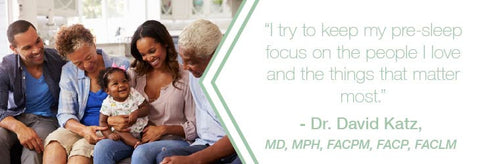
This habit was also on Dr. Rosenberg’s evening routine: “Cuddle with my lovely wife. Cuddling causes the release of oxytocin, a hormone that decreases anxiety and promotes relaxation.”
11. Keep to a Consistent Sleep Schedule : While Americans may know how much sleep they should get during a given 24-hour period, a significant percentage of them are not successful at hitting the mark. The 2009 Behavioral Risk Factor Surveillance System Sleep Module polled 74,571 adults in 12 states to determine the prevalence of unhealthy sleep patterns in America. The report showed that 35.3 percent of adults reported getting less than seven hours of sleep in a normal 24-hour period of time.
“I aim for a pretty consistent sleep time, and to spend 8 hours in bed whenever possible. I don't always sleep perfectly well even so- but all of this, and making sleep a priority, certainly helps!” said Dr. Katz.
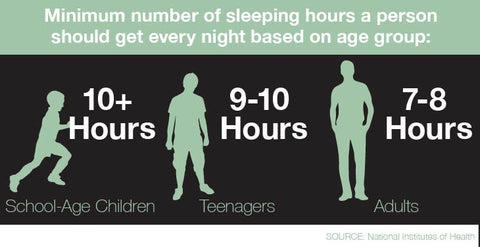
12. Declutter Your Bedroom: Even if you use black-out blinds, a cluttered bedroom can still impact your sleep. “When it’s time to go to bed, in my bedroom, I clean up any clutter because a clutter-free bedroom helps calm my mind” said Dr. Shane.
You can also use Feng Shui room design to help you sleep better.
13. Establish a Deadline for Alcohol Consumption: Studies have shown that drinking alcohol late in the evening can help you fall asleep faster, but they’ve also proven that doing so can cause you to sleep lighter and experience sudden awakenings. They also show that alcohol can have a negative effect on your sleep cycles and it can impair your REM sleep. This means that your body will not enjoy the full rejuvenating effects that REM sleep provides. To sleep better and avoid missing out on these healthy effects, set a deadline to stop drinking alcohol so that your body will have enough time to rid itself of alcohol before you go to bed. As a general rule of thumb, it’s advisable to stop consuming alcoholic beverages at least three hours prior to going to sleep.
14. Take Magnesium: Magnesium is a proven anti-stress mineral that optimizes circulation and blood pressure, restores balance to your blood sugar, and calms your nervous system, among other things. Since magnesium takes so much stress off of your body, having the right amount of it in your system can improve your sleep quality. Because your body uses magnesium for so many things, however, a lot people have a magnesium deficiency which can have a negative impact on the quality of their sleep. For this reason, you should consider taking magnesium before you go to bed.
A renowned Los Angeles-based personal trainer, fitness model, and athlete, Astrid Swan agrees that taking magnesium can help improve the quality of your sleep because she has experienced the benefits of magnesium firsthand. When asked about her personal sleeping habits, Swan said, “Sleep for me is necessary! I always drink a glass of water with 1 spoonful of Calm magnesium before bed. It helps ‘calm’ my nerves and my muscles. I set the thermometer to 70 degrees & cover myself like a hibernating bear, but keep one leg out! I am all about comfort so I wear soft and lose pjs. I turn my phone on silent so if you try to reach me after 930pm, I’ll respond at 5am! My little dog spoons into me and I’m out like a light!”
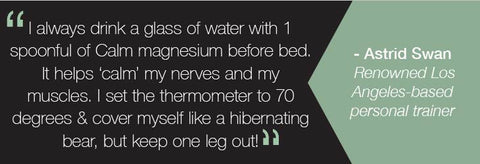
Dr. Rosenberg also included magnesium in his evening routine: “I take a warm bath with Epsom salt because the magnesium content is absorbed through the skin. The magnesium ions help me relax which improves my sleep.”
15. Use White Noise: According to the National Sleep Foundation, 74 percent of Americans feel that a quiet sleeping space is necessary for a good night’s sleep, but only 5 percent of them use a sound conditioner to reduce or eliminate sounds that could interfere with their sleep. While you’re asleep, your brain still picks up noises on a basic level which can cause you to wake up, move between sleep stages, or effect your heart rate or blood pressure, all which has a negative influence on your overall sleep.
You can reduce the negative effect that unexpected noises have on your sleep by using white noise. White noise reduces the difference between background noises and disturbing sounds such as the blare of a car’s horn. White noise is an ambient sound that helps you sleep through sounds that would otherwise disturb your sleep. You can use a sound conditioner or a box fan to provide a constant backdrop of white noise to help you remain asleep throughout the night.
16. Wash Your Sheets: Washing your sheets at least once per week can help improve your sleep, especially if you have allergies. Washing your sheets will remove the allergens that can disrupt your sleep from your sheets. If you’re allergic to dust mites, you should also fit your mattress, box spring, and pillows with covers that will prevent dust mites from living in them.
In addition to removing allergens, washing your sheets weekly will give them a fresh scent, which may help you sleep better. The National Sleep Foundation reports that more than 75 percent of people get more excited about going to bed when their sheets smell fresh and about three-quarters of individuals sleep more comfortably when their linens have a scent of freshness.
17. Engage in Constructive Worrying In addition to keeping work out of the bedroom, you should leave your worries outside of your sleeping space as well to improve your sleep.
Part of Dr. Rosenberg’s evening routine for better sleep includes what he calls constructive worrying, “I will write down my problems at 5 to 6pm and my solutions and make sure I do not take them into the bedroom.”
18. Eat Early: To improve your sleep, you should avoid eating immediately before bed to prevent changes in your blood sugar from negatively impacting your sleep. To prevent changes in your blood sugar from disturbing your sleep, eat dinner at least two or three hours prior to your bedtime. If you are hungry later, avoid having a snack that has a lot of carbohydrates and go for one rich in protein instead. If possible, have a protein such as turkey that has tryptophan in it because studies show this amino acid can actually increase your level of drowsiness.
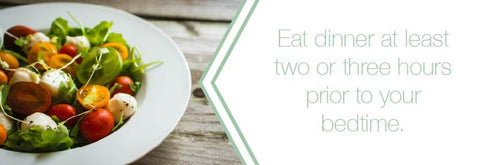
19. Wind Down: Giving yourself time to just relax before bed can increase the chances that you’ll get the amount and quality of sleep that is optimal for you. Best-selling author and wellness expert, David Kirsch, has spent more than 20 years discovering and harnessing the connection between the human mind, body, and spirit. The founder of New York’s award-winning Madison Square Club, Kirsch works with many A-list celebrities and has made appearances on popular television shows, including The Today Show, E!, CNN World News, and Dr. Oz.
When asked about the daily winding down regime he follows to get a sound night’s sleep, Kirsch said, “As I prepare for bed, I wind down on all of my ‘devices’, do some evening grooming; drink a cup of chamomile tea; and either read a book, or [attempt to] finish the NYT crossword puzzle.”
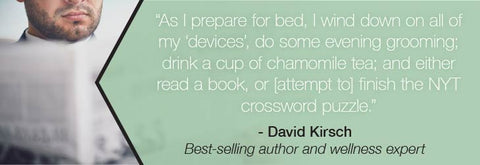
20. Meditate, Yoga, Visualization or Prayer: You don’t have to be spiritual to appreciate the benefits of meditation to help wind down and reduce stress. Stress may be one of the biggest factors to blame for sleep deprivation. A 2009 survey performed by the American Psychological Association revealed that 75 percent of adults living in America experienced moderate to high stress in the preceding month. The survey also showed that the stress levels teenagers experienced due to school and family finances had increased for about 50 percent of the polled teens in the past year.
When you’re stressed, your adrenal glands release hormones which can prevent you from going to sleep. While anxiety and sleep are sometimes mutually exclusive, there are steps you can take to prevent stress from interfering with your ability to get enough sleep. One step is to keep work and the things related to it such as your laptop, tablet, and mobile phone out of your sleeping area.
Visualization can also help those who have a difficult time getting to sleep faster. “If I'm having trouble falling asleep I practice visualization,” Dr. Rosenberg explains. “I get into bed and visualize myself at a tropical beach. I imagine the sound of the ocean, the warm feeling of the sun on my skin and the clear blue sky. In a few minutes I am asleep.”
21. Find a Mattress and Pillow to Meet Your Body’s Needs: In order to get better sleep you need to find a mattress that will support your sleep position and needs. Your bed plays an important part in your evening routine. Developing a great evening routine and following these expert tips to sleep better won’t help you if you have a poor quality mattress. “Buy the best mattress that you can afford,” suggests Kathy Grigg. “An old mattress that is not supportive will cause you to toss and turn at night disrupting your sleep. At CRaVE Mattress, we believe everyone deserves a good quality mattress at a decent price to get a good night’s sleep.”
To find the best mattress for you, check out our mattress buying guide.
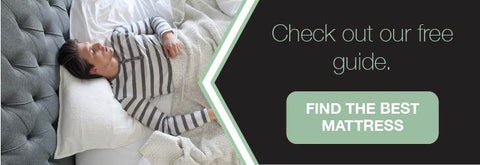
Common Sleep Disorders
Just about everyone has difficulty getting a sufficient amount of sleep on occasion, but if you’re struggling to get to sleep or to stay asleep constantly, you might be battling a sleep disorder.
According to the Centers for Disease Control and Prevention, approximately 50-70 million adults in the United States suffer from a sleep or wakefulness disorder. This means that around 15.5-21.7 percent of the nation’s population may not be getting the proper sleep they need to function successfully throughout the day.

Some common sleep and wakefulness disorders include the following conditions:
- Insomnia: Insomnia is most often blamed for a person’s inability to either fall asleep or sleep soundly. Your medications, caffeine consumption, stress level, or a health condition are among the many things that can cause you to experience insomnia. Fortunately, insomnia can normally be cured simply by adopting some lifestyle changes such as developing good sleep habits.
- Circadian Rhythm Disorders: In essence, your circadian rhythms comprise a 24-hour internal clock that tells your brain when you should be awake and when you should be sleeping. Your circadian rhythms are heavily influenced by light. When the sun comes up and it’s bright outside, your circadian rhythms rouse you from sleep. When it’s dark outside, your brain releases melatonin, a hormone that makes people drowsy. If your circadian rhythms are disrupted, it can cause a variety of problems that can effect your ability to get to sleep and/or the quality of your sleep, including insomnia and jet lag. Individuals who suffer from depression, bipolar disorder, or seasonal affective disorder often experience disruptions in their circadian rhythms.
- Delayed Sleep Phase Disorder: If you suffer from this condition, it means your sleep and wakefulness cycle is delayed compared to the cycle of the majority of other people. Individuals with delayed sleep phase disorder are generally unable to fall asleep earlier than between 2am and 6am regardless of their best efforts to go to sleep. People with delayed sleep phase disorder often have difficulty maintaining a conventional 9-to-5 work schedule.
- Sleep Apnea: Like insomnia, sleep apnea is a common sleep disorder. People who have sleep apnea typically wake up during the night because their breathing temporarily stops as the result of a blockage in their airways. Even though a lot of sleep apnea sufferers don’t remember their condition waking them overnight, they still experience the consequences of not getting enough sleep during the daytime.
- Restless Legs Syndrome: People with this disorder experience interrupted sleep because the syndrome gives them physical sensations such as tingling or achiness that make them involuntarily move their legs as a response. While the name of this disorder indicates that these sensations only occur in a person’s legs, some people with this syndrome experience uncomfortable feelings in their arms, which make them move their arms in response instead of their legs.
- Narcolepsy: Individuals who have narcolepsy struggle with excessive, overpowering sleepiness during the day. Narcolepsy is the result of a dysfunction in the part of the brain that controls your sleeping and waking. People with this sleep disorder may suddenly fall asleep unexpectedly while they’re talking or while they’re at work or behind the wheel of a vehicle.
The Benefits of Establishing Good Sleep Habits
Although some sleep disorders such as sleep apnea may require you to seek medical assistance, others, including insomnia, can often be cured or managed when people with these conditions learn how to sleep better. It’s imperative for you to address sleep abnormalities because individuals who suffer from persistent sleep deprivation can experience serious health and lifestyle consequences. People who fail to get enough sleep consistently are more likely to suffer from chronic and sometimes deadly diseases, including hypertension, diabetes, depression, obesity, and cancer. It’s also more likely that they will experience difficulty with their activities of daily living and with maintaining their normal productivity levels at work.
If you have a sleep disorder, it can make you a danger on the road as well. Data collected by the CDC shows that approximately 1 in 25 adult drivers in America say they’ve fallen asleep while driving in the preceding 30 days. While a driver falling asleep behind the wheel clearly creates a dangerous situation, drowsy driving can also lead to devastating results. According to the National Highway Traffic Safety Administration, drowsy driving was the cause of an estimated 72,000 automobile crashes in 2013, which caused 44,000 injuries. Although the NHTSA estimates that drowsy driving was responsible for 800 deaths in 2013, the CDC cites drowsy driving as the cause of as many as 6,000 lethal car accidents every year.

While learning how to get better sleep can help you stay healthy, enable you to be productive on the home and work fronts, and keep you safe on the road, the benefits of getting enough quality sleep extend to your memory and your ability to learn as well. Although further research is necessary to fully understand sleep, learning, and memory and their relationships, studies of both animals and humans indicate that the amount and quality of your sleep has a direct impact on your memory and learning abilities. Getting an adequate amount of quality sleep enables you to focus, something that is a prerequisite for learning new things efficiently. Sleep also plays a role in consolidating your memory, which is necessary for you to retain the information you learn.
While the mechanics are still being researched, it’s generally accepted that learning and memory involve three functions, acquisition, consolidation, and recall. Acquisition relates to when you’re introduced to new information. Consolidation refers to when the information you’ve acquired becomes a stable memory. Recall refers to your ability to remember the information you obtained either consciously or unconsciously.
Acquisition and recall occur when you’re awake, but research indicates that consolidation occurs when you’re asleep as neural connections are strengthened to form memories. Many researchers currently hold the opinion that the particular traits that brainwaves have during the various stages of sleep are related to the creation of certain kinds of memories.
Even though research is still ongoing, it is widely believed that getting enough quality sleep greatly improves your memory as well as your ability to learn things. It is also generally accepted that the additional benefits of logging enough hours of quality sleep include an enhanced mood, better decision-making, improved judgement, and a better ability to accurately interpret the events that unfold around you.
Do you have a good sleep habit? Let us know on our Facebook page or in the comments below!

